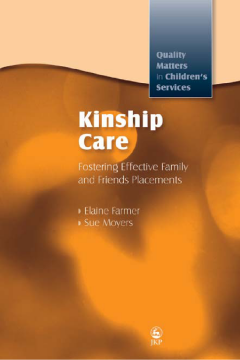
Additional Information
Book Details
Abstract
Children are frequently cared for by relatives and friends when parents, for whatever reason, are unable to care for their children themselves. Yet there has been very little information about how well children do when placed with kin or how safe they are in these placements.
This book compares formal kinship care to traditional foster placements in order to ascertain which children are placed with kin, in what circumstances, how well such children progress, and how often these placements disrupt. The authors explore whether children placed with family and friends fare better or worse than other foster children, what services are provided and needed, and how kin care is experienced by carers, children and social workers.
This book will be essential reading for social workers, policy makers, students and all those working with looked-after children, and will enable local authorities to make informed decisions about where best to place children and the support needed by family and friend carers.
Elaine Farmer is Professor of Child and Family Studies in the School for Policy Studies at Bristol University, and has researched and written widely in the field of child welfare and child protection. She has a background in social work practice and teaches on the qualifying programme in social work and the post-qualifying award in child care. Sue Moyers is a visiting fellow in the School for Policy Studies at Bristol University. She has spent many years in research with looked-after children and foster carers.
This book should be required reading for all those who are working with children in care and who are involved in the processes of assessing and determining the most appropriate placements for children, including local authority and independant social workers, guardians and psychologists. It has valuable messages for policy makers and academics.
Seen and Heard
This book highlights the need for a national policy and practice framework, building on good practice around the country when it comes to assessing and supporting kinship carers. It is a valuable source of statistical evidence, case studies and personal perspectives. I would recommend it for social workers, policy makers and everyone working with or for children in care.
Foster Care Magazine
Table of Contents
| Section Title | Page | Action | Price |
|---|---|---|---|
| Acronyms and Glossary of Spanish and Portuguese words | |||
| Map and Latin America in Figures | |||
| Introduction | |||
| Chapter 1: The Curse of Wealth | |||
| Chapter 2: Promised Land | |||
| Chapter 3: A Land in Flames | |||
| Chapter 4: Mean Streets | |||
| Chapter 5: Growing Pains | |||
| Chapter 6: Writing on the Wall | |||
| Chapter 7: No Fit State: The State and Politics | |||
| Chapter 8: Men at Arms: The Military | |||
| Chapter 9: The Left: Guerrillas, Social Movements and the Struggle for Change | |||
| Chapter 10: Women's Work: Gender and Politics | |||
| Chapter 11: Race Against Time: Indigenous Peoples | |||
| Chapter 12: Thy Kingdom Come: The Church | |||
| Conclusion | |||
| Further Reading |
